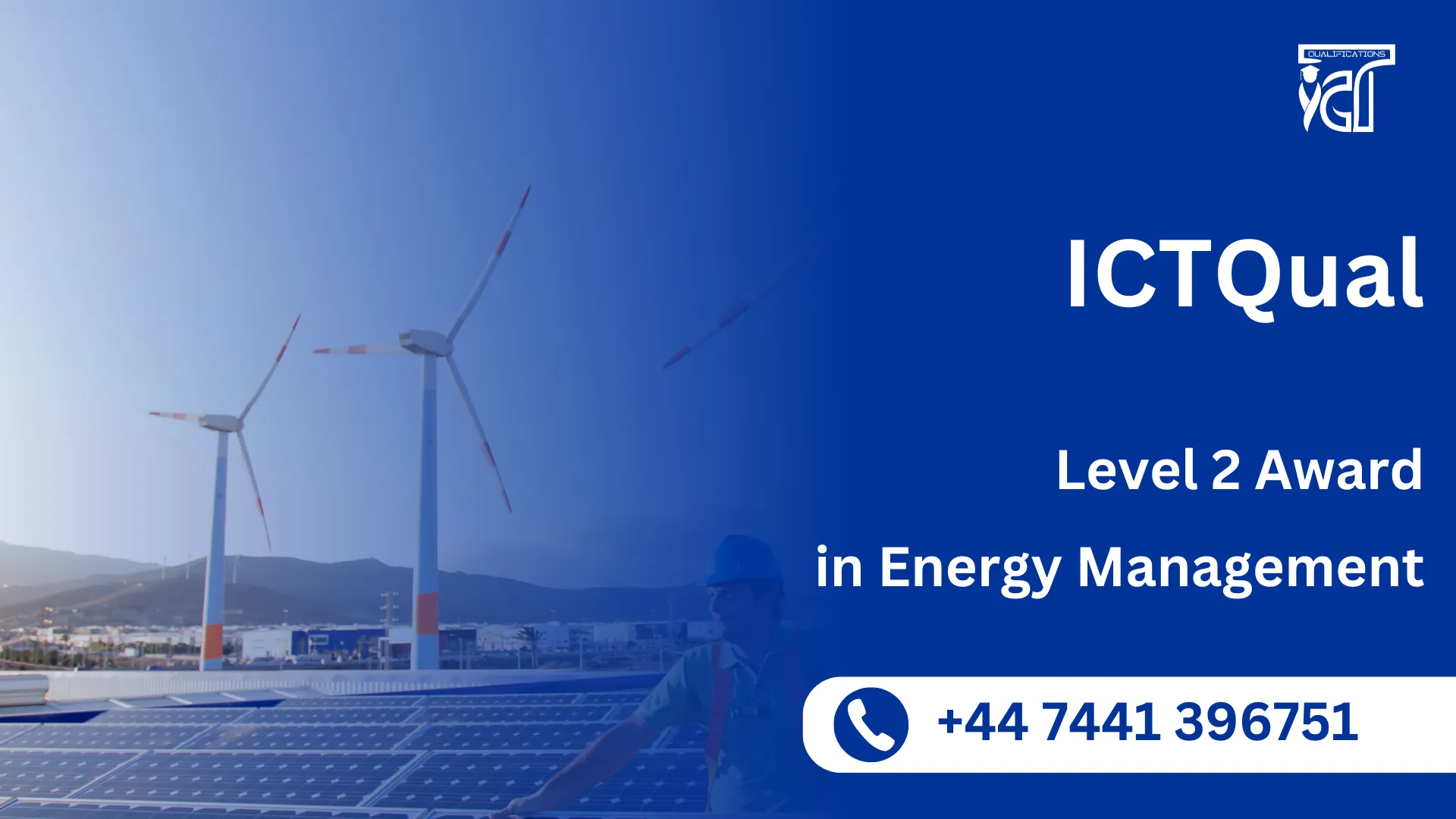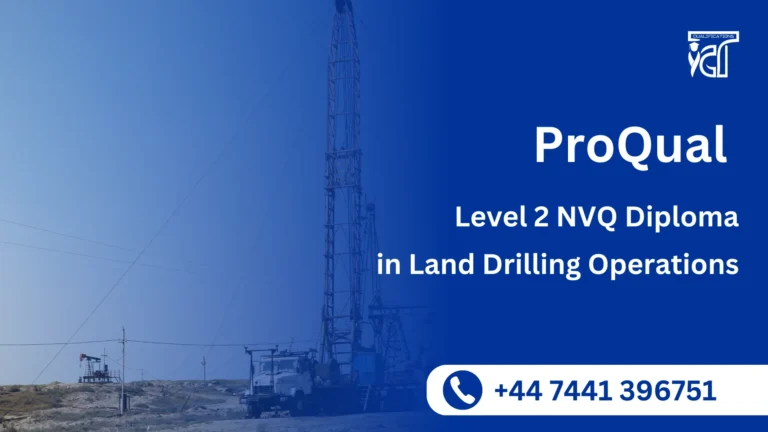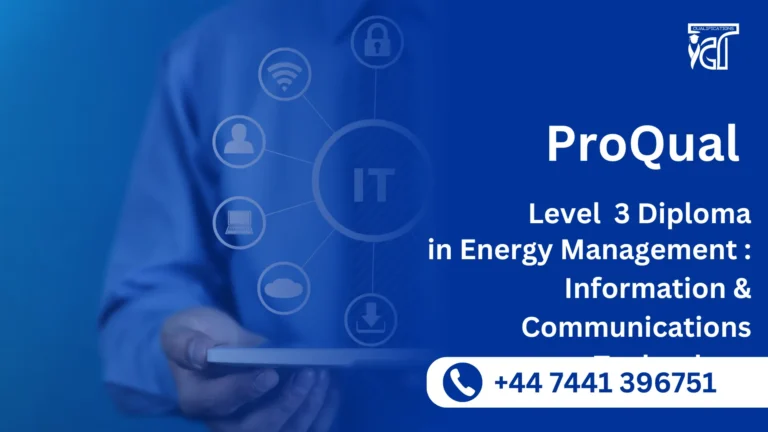In today’s rapidly changing world, businesses and organizations are increasingly focused on reducing their energy consumption and adopting more sustainable practices. This shift has created a high demand for skilled professionals who can manage energy efficiently and help organizations meet their sustainability goals. One of the most effective ways to gain the necessary skills for this growing industry is by pursuing the ICTQual Level 2 Award in Energy Management.
This globally recognized qualification is ideal for individuals looking to begin their journey in energy management, offering foundational knowledge that can be applied across various industries. In this blog post, we’ll explore everything you need to know about the ICTQual Level 2 Award in Energy Management, including the course overview, benefits, learning outcomes, and more.
The ICTQual Level 2 Award in Energy Management is a beginner-level qualification designed to introduce individuals to the essential concepts of energy management. It is a perfect starting point for those interested in understanding how to manage energy consumption efficiently and promote sustainability in various organizational settings.
The course covers key aspects of energy management, including energy audits, energy efficiency measures, sustainability practices, and cost-saving strategies. This Ofqual-regulated qualification provides the knowledge and skills required to help businesses reduce energy costs, improve energy efficiency, and contribute to reducing their carbon footprint.
The ICTQual Level 2 Award in Energy Management is designed for individuals who are new to the field of energy management and wish to develop a basic understanding of how to manage energy in an organizational setting. The course is suitable for employees in roles such as facilities management, operations, or sustainability, as well as individuals aiming to transition into energy management roles.
The ICTQual Level 2 Award in Energy Management is a valuable qualification for anyone looking to start or develop their career in the energy management field. With its focus on energy efficiency, sustainability, and practical energy-saving strategies, this course equips you with the essential skills needed to succeed in a growing industry. Whether you are an individual looking to switch careers or an employee aiming to contribute to your organization’s sustainability efforts, this course offers the knowledge and expertise needed to make a meaningful impact.
Start your journey in energy management today with the ICTQual Level 2 Award in Energy Management and contribute to creating a more sustainable and energy-efficient world!
ICTQual Level 2 Award in Energy Management
This qualification, the ICTQual Level 2 Award in Energy Management, consists of 11 mandatory units:
| Sr# | Unit Title |
|---|---|
| 1 | Fundamentals of energy management |
| 2 | Energy consumption awareness in the workplace |
| 3 | Reducing energy consumption in the workplace |
| 4 | Importance of collecting and managing energy data |
| 5 | Energy consumption in buildings and processes |
| 6 | How energy use equipment and systems operater |
| 7 | Importance of energy audits and assessments in the workplace |
| 8 | Legislative and regulatory requirements covering energy |
| 9 | Importance of an organisation’s energy strategy, planning and policy |
| 10 | Role of design, installation and commissioning of energy use equipment and systems |
| 11 | Use of operational and maintenance controls to operate the energy use equipment and systems efficiently |
GLH (Guided Learning Hours) and TQT (Total Qualification Time) are terms commonly used in vocational qualifications to help define the amount of time a learner is expected to spend on their studies.
1. GLH (Guided Learning Hours)
GLH refers to the number of hours a learner spends being directly taught, supervised, or supported during their course. This includes the time spent in activities such as:
- Classroom instruction
- Practical workshops
- One-on-one tutoring or mentoring sessions
- Online learning sessions with tutor support
In other words, GLH represents the time that learners are actively engaged with their instructors or learning activities.
2. TQT (Total Qualification Time)
TQT represents the total amount of time a learner is expected to invest in completing a qualification, including:
- GLH (Guided Learning Hours): Time spent on direct learning, as explained above.
- Self-Directed Learning: This includes time spent on independent study, research, assignment completion, preparation for exams, and any other work the learner does outside of direct teaching hours.
TQT is a broader measure that includes all the time required to achieve the qualification. It helps learners and employers understand the overall commitment required for the qualification.
Key Differences Between GLH and TQT:
- GLH focuses on direct learning with guidance or supervision.
- TQT includes GLH as well as independent study time and other learning-related activities.
Example:
If a qualification has a TQT of 600 hours and a GLH of 250 hours, it means the learner should spend 250 hours in direct learning (classroom, online, or tutor-led sessions) and 350 hours on independent study or research.
Here are the learning outcomes for each study unit:
Fundamentals of Energy Management
- Define the concept of energy.
- Identify various forms of energy.
- Define carbon emissions.
- Define energy management.
- Identify the significance of core energy management competencies, encompassing Technical and Operational skills, Energy Assessment and Measurement & Verification techniques, Behavioral Change and Motivation strategies, Regulatory and Legal Compliance, Carbon Management, Strategic Planning, Waste Management, Procurement, Transportation, Water, and ICT.
- Explain the responsibilities and functions of an energy manager.
- Describe the process of energy reporting.
- Explain how energy reporting contributes to the reduction of energy consumption.
Energy Consumption Awareness in the Workplace
- Describe the diverse applications of energy within the workplace.
- Elucidate the variations in energy usage concerning the equipment utilized in the workplace.
- Detail common inefficiencies in energy utilization within working environments.
- Outline methods for measuring energy consumption in the workplace.
- Discuss potential energy-saving practices that can be implemented to decrease energy consumption.
- Expound upon the organizational advantages resulting from reduced energy consumption.
Reducing Energy Consumption in the Workplace
- Identify opportunities for reducing energy consumption through efficiency improvements and behavioral changes.
- Implement energy-saving measures and best practices within the workplace.
- Monitor and evaluate the effectiveness of energy reduction initiatives.
- Collaborate with colleagues and stakeholders to promote a culture of energy conservation.
Importance of Collecting and Managing Energy Data
- Describe sources for obtaining energy data.
- Explain the process of gathering energy data.
- Recognize various types of meters.
- Identify unique identifiers for meters.
- Discuss the components of an energy bill, including meter-specific details.
- Outline different methods for collecting energy data.
Importance of Energy Audits and Assessments in the Workplace
- Outline the structure for conducting energy audits.
- Discuss different methodologies for conducting energy assessments.
- Illustrate the significance of energy audits and assessments in identifying opportunities for enhancing energy efficiency.
Legislative and Regulatory Requirements Covering Energy
- Identify existing legislation aimed at decreasing energy consumption and reducing carbon emissions.
Importance of an Organization’s Energy Strategy, Planning, and Policy:
- Describe the significance of an organization’s energy strategy, planning, and policy.
- Summarize an organization’s energy goals and targets.
- Recognize the advantages of implementing an organization’s energy strategy, planning, and policy.
- Identify worldwide energy trends and their implications for organizational settings.
Energy consumption in buildings and processes:
- Identify various energy sources within a building or process.
- Recognize the methods of energy distribution from the source to users within a building or process, such as through electric cables, pipes, ducts, etc.
- Analyze data to identify the primary energy-consuming equipment and systems.
- Develop a profile illustrating energy consumption within a building or process.
- Identify key mechanisms for energy gain, loss, and potential recovery (e.g., electricity and heat) within a building or process
Energy consumption in buildings and processes:
- Identify diverse energy sources utilized within a building or process.
- Recognize the pathways through which energy is distributed from its source to users within a building or process, including electric cables, pipes, ducts, etc.
- Analyze available data to pinpoint the primary energy-consuming equipment and systems.
- Develop a comprehensive profile depicting energy consumption patterns within a building or process.
- Identify critical mechanisms involved in the acquisition, loss, and potential recovery of energy (both electricity and heat) within a building or process.
Role of design, installation and commissioning of energy use equipment and systems
- Explain the interrelation between the energy consumption of one piece of equipment and its impact on the energy usage of other equipment.
- Highlight the significance of design, installation, and commissioning in influencing the anticipated operational lifespan of energy-consuming equipment and systems.
- Detail the specifications and installation criteria necessary for energy-efficient equipment design.
- Discuss methodologies employed to verify that energy-consuming equipment and systems are installed, tested, and commissioned in accordance with energy-efficient design standards.
Use of operational and maintenance controls to operate the energy use equipment and systems efficiently
- Highlight the significance of operational and maintenance controls in prolonging the intended lifespan of energy-consuming equipment and systems.
- Identify resources for obtaining information regarding operational and maintenance controls for energy-consuming equipment and systems.
- Specify the operational and maintenance criteria necessary for enhancing energy efficiency in equipment and systems, including start-up and shutdown procedures, aligning energy demand with supply, scheduling techniques, operational procedures, maintenance protocols, etc.
Benefits of the ICTQual Level 2 Award in Energy Management
The ICTQual Level 2 Award in Energy Management offers several key benefits that make it a valuable qualification for individuals looking to enter or advance in the energy management field. Below are the top advantages of pursuing this course:
1. Industry-Recognized Qualification
The ICTQual Level 2 Award in Energy Management is Ofqual-regulated, ensuring it meets the highest standards of quality and recognition in the industry. This globally recognized certification adds credibility to your resume and demonstrates your commitment to energy efficiency and sustainability.
2. Foundational Knowledge in Energy Management
This course provides essential foundational knowledge of energy management. You’ll gain a comprehensive understanding of energy efficiency, energy-saving measures, and how to conduct energy audits. This makes it perfect for beginners looking to establish a solid understanding of energy management principles.
3. Career Advancement Opportunities
Energy management is a growing sector, and professionals with energy management expertise are in high demand. The ICTQual Level 2 Award will help you qualify for entry-level roles like Energy Coordinator, Facilities Manager, or Sustainability Assistant, and provide a stepping stone for future career progression.
4. Practical Skills for Real-World Application
The course focuses on practical, real-world skills that can be immediately applied in the workplace. You’ll learn how to identify energy inefficiencies, implement energy-saving strategies, and support sustainability initiatives, helping organizations reduce costs and improve energy performance.
5. Cost-Saving Benefits for Organizations
By gaining the skills to identify energy inefficiencies and implement energy-saving measures, you’ll be able to help organizations reduce their energy consumption and cut operational costs. These cost-saving benefits are a key selling point for employers, making you a valuable asset to any company.
6. Contribute to Sustainability Goals
The course teaches you how to reduce energy consumption, which helps organizations meet their environmental sustainability goals. This is particularly important as businesses and governments worldwide are focusing on reducing carbon emissions and improving sustainability practices.
7. Improve Environmental Impact
As energy management directly impacts an organization’s carbon footprint, this qualification enables you to contribute to environmentally-friendly initiatives. By promoting energy efficiency, you’ll help organizations reduce their environmental impact, aligning them with global sustainability efforts.
8. Enhanced Job Security
As companies increasingly focus on improving their energy efficiency, qualified professionals in energy management are becoming more valuable. Completing the ICTQual Level 2 Award increases your job security by enhancing your qualifications in a sector that is experiencing significant growth.
9. Flexible Learning Options
The ICTQual Level 2 Award in Energy Management offers flexibility in learning, allowing you to study at your own pace and in a way that fits your schedule. This makes it suitable for working professionals, individuals with other commitments, or anyone seeking to enhance their skills in energy management.
10. Pathway to Advanced Qualifications
Upon completion, you can progress to more advanced energy management qualifications, such as the ICTQual Level 3 Award or Level 4 Diplomas. These qualifications will further develop your skills and knowledge, enabling you to take on more senior roles in energy management and sustainability.
11. Compliance with Regulations
With a growing focus on energy regulations and sustainability laws worldwide, this course will help you understand relevant energy-related regulations and policies. This knowledge ensures that you are prepared to help organizations stay compliant and meet their legal obligations.
12. Networking Opportunities
Being part of the energy management community opens up networking opportunities. You can collaborate with professionals in similar fields, share best practices, and grow your industry connections, which can lead to career opportunities and personal development.
13. Increased Organizational Efficiency
By implementing the energy-saving practices learned in this course, organizations can operate more efficiently, reduce waste, and improve overall productivity. This will not only save costs but also create a more efficient working environment.
Best Fit for the ICTQual Level 2 Award in Energy Management
The ICTQual Level 2 Award in Energy Management is designed for a wide range of individuals looking to gain foundational knowledge and skills in energy management. Below are the ideal candidates who will benefit most from this course:
1. Individuals New to Energy Management
If you’re new to the field of energy management and want to build a strong foundation, this course is a perfect fit. It provides the essential knowledge and practical skills to help you understand energy efficiency and how to implement energy-saving measures within organizations.
2. Facilities Managers
Facilities Managers who are responsible for overseeing the operation and maintenance of buildings can significantly benefit from this course. The skills gained will help them optimize energy consumption, improve sustainability efforts, and reduce energy costs within the buildings they manage.
3. Sustainability Professionals
If you’re working in a sustainability or environmental role, the ICTQual Level 2 Award in Energy Management is a great way to expand your knowledge of energy-saving practices. This course will enhance your ability to drive energy-efficient and environmentally sustainable practices within your organization.
4. Business Owners and Entrepreneurs
Business owners or entrepreneurs, especially in energy-intensive industries such as manufacturing, retail, or hospitality, will benefit from the practical energy-saving strategies taught in this course. It will enable you to reduce your operational costs, improve sustainability, and align your business with environmental regulations.
5. Operations Managers
Operations Managers responsible for overseeing daily business operations will find this course useful in optimizing energy use across their organization. The course will help you identify inefficiencies and implement strategies that lead to cost reductions and greater operational efficiency.
6. Energy Auditors
If you’re already working as an Energy Auditor or planning to transition into this role, the ICTQual Level 2 Award will provide a valuable foundation. The course covers basic energy auditing techniques, data collection, and energy efficiency analysis, making it a great introduction to the field of energy audits.
7. Individuals Looking to Transition into Energy Management
Those with experience in fields like business administration, engineering, or environmental science, who want to switch to energy management, will find this course an excellent starting point. It provides the practical knowledge needed to transition smoothly into the energy sector.
8. Environmental and Corporate Social Responsibility (CSR) Professionals
Environmental Managers and CSR Professionals who aim to integrate energy management into sustainability initiatives will find this course beneficial. The qualification enhances your ability to align organizational operations with green goals, helping organizations reduce their energy consumption and environmental footprint.
9. Graduates and Entry-Level Professionals
Recent graduates with backgrounds in business management, environmental science, or engineering can benefit from this qualification to kick-start their careers in the growing energy management field. The course provides practical and theoretical knowledge that prepares you for entry-level roles in energy management or sustainability.
10. Human Resources and Training Managers
If you are a HR professional or training manager within an organization looking to develop your team’s energy management skills, this course can help you equip your employees with the right tools to implement energy-saving strategies and improve sustainability efforts.
Entry Requirements
Register Now
Qualification Process
Qualification Process for the ICTQual Level 2 Award in Energy Management
- Self-Assessment:
Begin by evaluating your eligibility to ensure you meet the qualification requirements, including work experience, knowledge, and language proficiency. - Registration:
Complete your registration by submitting the required documents, including a scanned copy of a valid ID, and paying the registration fee. - Induction:
An assessor will conduct an induction to confirm your eligibility for the course and explain the evidence requirements. If you do not meet the criteria, your registration will be canceled, and the fee will be refunded. - Assignmnets & Evidence Submission:
Provide all assignmnets and the necessary evidence based on the assessment criteria outlined in the course. If you are unsure of the required evidence, consult with the assessor for guidance on the type and nature of evidence needed. - Feedback and Revision:
The assessor will review your submitted evidence and provide feedback. Evidence that meets the criteria will be marked as “Criteria Met,” while any gaps will be identified. You will be asked to revise and resubmit if needed. - Competence Evidence:
Submit final evidence demonstrating that all learning outcomes have been met. This evidence will be marked as “Criteria Met” by the assessor once it is satisfactory. - Internal Quality Assurance (IQA):
The Internal Quality Assurance Verifier (IQA) will review your evidence to ensure consistency, quality, and compliance with standards. - External Verification:
The IQA will submit your portfolio to ICTQUAL AB External Quality Assurance Verifiers (EQA) for final confirmation. The EQA may contact you directly to verify the authenticity of your evidence. - Certification:
Upon successful completion of all checks, ICTQUAL AB will issue your official certificate, confirming that you have attained the ICTQual Level 2 Award in Energy Management.







